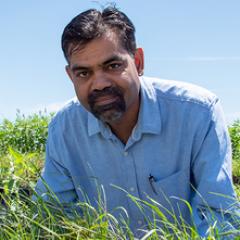Plant science
Plants are the lungs of the world. They draw down carbon and release the oxygen we breathe. Plants are cornerstones of nearly all ecological systems, produce food, feed/fodder, fibre and fuel and are sources of and factories for countless medicines and other chemicals.
Despite plants being incredibly diverse and adaptable, around two-thirds of the worlds calorific intake comes from just 3 crops: maize (corn), wheat and rice. Food supply is not on track to meet global population increases and land clearing is not a sustainable solution. All of this is in the face of climate change which is predicted to enhance the frequency of adverse weather events, disease and pest outbreaks.
Improving resilience of plants and their productivity, plant science researchers work across molecular, ecological and applied sciences to increase our knowledge of plants and optimise their role in agriculture and the environment. This research spans aspects of biotechnology, modelling, physiology, ecology, breeding, genetics, genomics and the development of novel enabling technologies. An example is the use of modern molecular approaches involving bioinformatics and gene insertion and/or genome-editing tools like CRISPR to develop new genotypes with enhanced traits of interest. This could include varieties having improved resilience, sustainability, or yield. Efforts to assemble genomes and better understand genetic/epigenetic function, as well as the discovery of new genes and signals, are also unlocking molecular mechanisms driving plant development.
New insights into plant-microbe interactions, including both pathogens and beneficial symbioses, reveal how plants communicate with their environment, which can help tackle aspects of soil remediation and land rehabilitation. Moreover, optimising plant architecture for different environments and growing conditions can help underpin efforts for adapting to climate change. Collectively, we contribute to the overall understanding of plants, with the goal of developing superior crops and optimising plant performance in nature and agriculture.
Our plant and crop science researchers collaborate with diverse national and international partners, including industry bodies, government agencies, NGOs, academic institutions and farmers to develop and implement stakeholder-relevant solutions. We lead cutting-edge research programs that provide noticeable impacts of national and global significance.
















